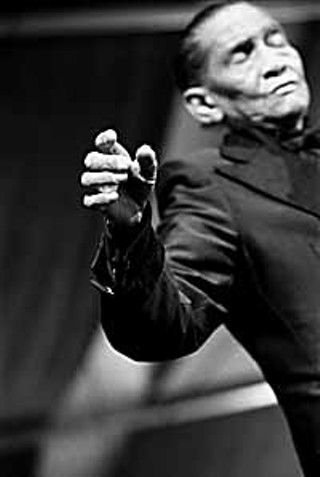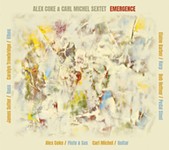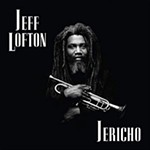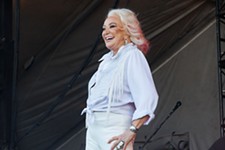New Orleans Jazz & Heritage Festival New Orleans, April 27-May 6
Reviewed by Raoul Hernandez, Fri., May 18, 2001

New Orleans Jazz & Heritage Festival
New Orleans, April 27-May 6
Suddenly, Al Green flashed before my eyes.Standing on a deserted stretch of Highway 71 45 minutes south of the Austin airport, my companion and I stared unbelieving at the acrid wisps of smoking rubber rising up from the shotgun-like blowout that had halted our pilgrimage faster than Michelins over an armadillo. It was sunset. We were just outside Flatonia.
"Yes, hi. Can I have the number for Triple-A road service?"
Hang on!
Mishaps such as this are precisely the rationale for cell phones, and fortunately, girlfriend had one. With 18-wheelers rocketing past at knee cap's length, oncoming darkness wasn't going to be a welcome handicap for a first-time wrecker. Me. Maybe pride was just going to have to grab some vinyl at the back of the Honda. At the last possible moment (they'd put her on hold), God smiled, and with one desperate final yank, a nut dislodged. On the tire, I mean.
"Great," scowled my Crescent City sponsor as we 45mphed back into town. "Now what? Get up early, get four new tires, and leave by 10?"
Tomorrow? Gates open at 11am. Al Green, the last of the great soul singers and first-day, mainstage headliner, probably goes on around 5pm. That's 18 hours max. Whatever it takes to get there: a bus, a train, maybe hitching a ride with the guys in the Stingers.
"Yes, hi. Can I have the number for Hertz Rent-A-Car?"
Sixty-five dollars and seven hours later, the classic rock station in Lafayette having saved our lives round about 4am (sing it: "Rosanna's daddy had a car she loved to drive … "), Lake Pontchartrain blooms blue with the morning sky's reflection. At 6am sharp, 500 miles logged, our Pontiac sedan glides into New Orleans to the big buttery beat of Fats Domino. It's almost a shame to sleep. Then again, what better wake-up call than Al Green?
Simply walking onto the dry grass of the Fair Grounds Race Course with 77,000 other faithful, the largest opening-day throng in the Jazz & Heritage Festival's storied 32-year history (new year, new attendance record), is a call to arms. This is hallowed ground, after all. Perhaps not as sacred as Congo Square, formerly Storyville, now Tréme, where legend has it 300 musicians played to an audience roughly half that many in the festival's inaugural year of 1970. But close enough: the food, the music, perfect 70-degree weather. Sounds like heaven to me.
"I feel pretty good today," announces the 55-year-old Green, still a handsome devil, his white suit unbloodied by the armfuls of red roses he continually tosses into the crowd during his 45-minute set. A flock of thousands, pooled into one end of the mile-long oval course (26 acres inside the dirt track) seem pleased. Less so 15-20 minutes later when Memphis' most famous Baptist minister is still preaching thanks and praise rather than fulfilling the announcer's ordination as "The Soul of Soul."
"Let's go back to 1972," calls out Green. "'Let's Stay Together.'"
One verse, two verse, chorus -- stop. He waves the band off.
"Up to 1973!" he proclaims. "'Love and Happiness.'"
Verse, verse, chorus. Stop. Wait! Go back. Too late, Green launches a medley: "Hold Me," "Let's Get It On" ("Does anyone remember Marvin Gaye?"), and ("Does anyone remember Otis?") "(Sittin' on) the Dock of the Bay." Suddenly, he drops to his knees, "Tired of Being Alone." Halfway through that, he reprises "Love and Happiness," Green's glorious past echoing briefly, but ultimately the singer's performance confirms what last year's confessional Take Me to the River revealed: converted, yes, conflicted, still. God help us if singing secular songs and sinning have become synonymous.
"He didn't finish a single song," cries one of our companions, outraged, waiting for a "professional" opinion. The official response, via the Rolling Stones: "I don't wanna walk and talk about Jesus, I just wanna see his face." This brings a blank look.
Meaning, this is precisely what defines the New Orleans Jazz & Heritage Festival at a certain level. Whereas a multitude of the purported 1,500 music festivals held each year in North America cater to the new and hip, Jazz Fest lionizes the old and historic. Roots music? How about root music -- blues, jazz, gospel, soul. Rock & roll. Much of it performed by musicians whose careers are foundation stones in the mosaic of modern music. While Al Green is probably no match for the new jack soul of Brian McKnight two days later, how many opportunities does one get to see Al Green perform? Or for that matter, "Little" Jimmy Scott?

Jazz and heritage seldom feed off each other more rapturously than they do inside Jazz Fest's jazz tent. If altar-size pictures of New Orleans' piano prince James Booker, Thelonious Monk walking alongside Dizzy Gillespie, Duke Ellington with Mahalia Jackson, the Sun Ra Orchestra, and even Woody Allen playing clarinet with the Preservation Hall Jazz Band, all taken over the decades at Jazz Fest and hanging from the ceiling, don't convey the genre's legacy within these canvas walls, a performance like the one delivered by Jimmy Scott on Saturday did.
Hard to fathom someone 76 years old never having gone through puberty -- never having their voice break -- but Cleveland-born voice-of-the-ages Jimmy Scott, who suffers from a hormonal disorder called Kallmann's Syndrome, possesses the other-worldy soprano to prove it. Had Billie Holiday been a man, she might have sounded like this elfin chanteur, who until recently jazz history had all but forgotten. Gesturing as though he were casting spells, Scott's heartbreaking balladry ran through "All of Me," "Sweet Embraceable You," and his new LP's swan-song, "When Did You Leave Heaven." Over the Rainbow follows last year's lovely Mood Indigo, but it's1969's The Source, a little-heard slice of timelessness that may well be Scott's finest half-hour, as well as 2001's reissue of the year.
Native hornman Nicholas Payton managed to cram even more jazz fanatics into the final resting place of their dreams directly after Scott. With both this "Armstrong Centennial Celebration" showcase and his new Verve LP Dear Louis honoring this year's festival figurehead, the 27-year-old, white-suited trumpeter and his eight-piece horn section had no trouble turning in a crowd-pleasing set. "Potato Head Blues," "St. James Infirmary," "Hello, Dolly!," and "West End Blues" all featured Payton's vivacious trumpet blasts, but uproarious set-ender "I'll Be Glad When You're Dead, You Rascal You" stole the show with Satchmoesque sass.
Only bebop beat-keeper Max Roach could have encored Payton's Place at this point, so it was only natural that the 76-year-old jazz titan lead off with a steady, mid-tempo, nothing-fancy drum solo that ended in cymbal crashes and distorted tom-tom poundings. Mainstays Tyrone Brown (bass) and Odean Pope (tenor sax) helped smooth the trumpet brawn of Eddie Henderson, but to no one's surprise, the hour belonged to the forever regal Roach, whose every solo rode a restless search for new ways to say the same things. His high-hat solo at the day's conclusion (7pm) predictably brought the house down. Five hours in the jazz tent, how sweet it is.
Given this, Sunday's first-weekend wrap-up felt like a victory lap. The Dixie Cups poured flat oldies like their signature tune "Chapel of Love," Femi Kuti kept his father's indomitable soul cry alive with bright, colorful Afro-pop, and the Big Easy's Big Daddy Terence Blanchard put ol' Wynton Marsalis to shame with dreamy blues à la Miles. The afternoon's best blowout came from local piano institution Henry Butler, whose barrel-house rumble and thick-as-mudbugs growl keeps New Orleans' patriarch of the keys, Professor Longhair, oo-mala-walla-wallaing into the long, dark, swampy night. Van Morrison, in fine fettle himself, brought the hits for nearly two hours. Not too shabby for a guy notorious for phoning 'em in, "Gloria-thons" notwithstanding.
Monday comes hard when the fair grounds are closed, despite fest-related workshops, in-stores, satellite shows, and enough Dr. John gigs to rename the city New Rebennack. Henry Butler crony and one-time Antone's Records signee Snooks Eaglin held court at bowling alley/bar Rock 'n' Bowl with Absolute Monster Gentleman of the ivories Jon Cleary and his band backing the blind blues guitarist. Eaglin's searing Les Paul lines and Cleary's sanctified electric piano kept the dance floor in front of the off-lanes stage in constant motion.
Tuesday, 11am, the Blind Boys of Alabama entered the French Quarter's Louisiana Music Factory, across from the House of Blues, like three blind mice -- all in a row, right hand on the right shoulder in front of them -- and got "froggy." On tour for their Real World tour-de-force Spirit of the Century, the three surviving 'bama boys croaked their way through the LP's "Nobody's Fault but Mine," "Amazing Grace" (by way of "House of the Rising Sun"), and "The Last Time," their high-spirited gospel harmonies accompanied by National Steel guitar. "When you just be getting out of bed," said one, "the frogs be getting in your throat." In this case, tonsils may be their natural habitat.
Donald Harrison Jr., meanwhile, looking very Coltrane next to a giant Blue Trane poster, was kinda froggy himself, his band a no-show in the noon hour. His alto sax, by contrast, was in good voice, its a cappella song sleepier than its forceful shout at the fair grounds Friday. "I don't know where they're at," chuckled Terence Blanchard's onetime foil in reference to his band, "but somebody's fired." Former Austin bassist Edwin Livingston appeared toward in-store's end, unpacking his stand-up only to zip it back up somewhat sheepishly.
Such is the feeling when you're not chasing the Crescent City's musical life force, but laying hands on the Mausoleum plots of H.R. Byrd, aka Professor Longhair (Gentilly's Mount Olive Cemetery), and James Booker (Providence Park Cemetery on Airline Drive), plus kneeling by the urn of Gram Parsons (Garden of Memories, also on Airline Drive) were silent respites from brass and second-line stomps. So was skipping Thursday at the fair grounds.
Truth be told, by the second weekend, wallets are flagging. While Jazz Fest sells as many tickets as folks care to plunk down $20 a day for, soft-shell crab, oyster, and alligator po'boys, and life-sustaining crawfish bread and strawberry lemonade add up in calories. Music is fattening, too; takes plenty of carbs to stage hop. The Hackberry Ramblers' Cajun-fed country music, Wilson Pickett's post-hospital-stay "Land of 500 Dances" set ("Funky Broadway" kicks "Mustang Sally"), and Paul Simon's grooving, slip-sliding-away two-hour tour of his gem-encrusted catalogue, which included serious reappraisal of last year's ignored You're the One, left little room for Saturday.
Which was bon, because after frying for more than an hour in the crawfish-broiling afternoon sun waiting for Pickett-voiced N.O. MC Mystikal to shake his ass and show us what he's working with (the scabrous, triple platinum Let's Get Ready mostly), there was very little "Azucar" flowing through our bloodstreams for Havana's Queen of the Salsa, Celia Cruz, whose Cinco de Mayo throwdown at the writhing, twirling Congo Square stage justified the 76-year-old singer's being made a honorary citizen of the city by mayoral proclamation.
The only day we arrived at the fair grounds before 2:30pm, the first Sunday in May traditionally drives home 10 days of Jazz Fest in the only fashion imaginable: New Orleans-style. Stopping in for some good vibes (as well as drums, bass, and alto) from Jason Marsalis, comparing the old-school clarinet of youngster Tim Laughlin with the avant stylings of veteran Alvin Batiste, then throwing out a "hallelujah" or three with the St. Raymond Gospel Choir in the gospel tent were mere formalities to Sunday's real agenda: staking out a plum spot in front of the main stage. At 11:30am, our mission was accomplished. We were 50 yards from the big, black Yamaha piano centerstage.
Third in line behind perhaps only "Fess" Longhair and Huey "Piano" Smith, who was rumored to be playing the same night we were rocking 'n' bowling, Allen Toussaint's funky R&B not only defined New Orleans' modern era piano legacy, his production work for the likes of local legends such as Ernie K-Doe, Irma Thomas, Lee Dorsey, and a little ol' band called the Meters all but put the city on the map in the Sixties. To have him pump out an hour's worth of rollicking Crescent City soul as warmup to the No. 1 pick of our 10-day musical immersion was almost too good to be true. We shook it unencumbered.
"Two men changed the face of music," bellowed the announcer two hours later. "One was Louis Armstrong, to whom this festival is dedicated. The other is Fats Domino." That's right, "The Fat Man," whose debut single of the same name sold a million copies on its release in 1950 and is cited by many music historians as the first rock & roll song. Fats Domino, whose string of 35 Top 40 singles between 1955-1963 influenced an entire generation of musicians, from the Beatles to Led Zeppelin. Fats Domino, 73-year-old scion of New Orleans who plays out rarely, still lives in the same neighborhood where he grew up, and has a giant "F.D." on the purple roof of his house. Fats Domino, a cornerstone of my mother's youth, and therefore mine.
And suddenly, he flashes before my eyes, his black Hawaiian shirt with bright green, yellow, and red leaves as blinding as a neon roadhouse billboard spotlighting this momentous occasion. Diamonds the size of dominoes light his right hand as it runs down the piano keys with the agility of a jungle cat. Opener "I'm Walkin'," a song I never thought about until Rounder Records sent out Domino's late-Sixties comeback last year (Fats Is Back) and reminded me that this giant still walks among us, suddenly reveals itself as one of the first songs I ever heard on one of my mom's 8-tracks. Suddenly, tears are streaming down my face, and they won't stop.
"I'm Walkin'," "Blue Monday," "Poor Me," "I'm Ready," "Josephine" -- one after another he belts them out. Not "runs though" like forever-touring kitsch/oldies acts from Little Richard to Chuck Berry. Belts. Like a jazzman who imbues each and every individual performance with the collective pride of the legacy he mines. Hooded eyes turned skyward, deep furrows running down the length of his nose to his thin moustache, his small, gold teeth, and ebullient smile, Fats remains rock & roll's teddy bear. "I'm in Love Again," "My Blue Heaven," Blueberry Hill," "I'm Gonna Be a Wheel Someday" -- the bounce that changed rock & roll.
"Thank you very much," he says, the only address of his 75-minute set. "Right now I'm gonna do the first record I recorded in 1949."
"The Fat Man," "Walkin' to New Orleans," "Shake, Rattle & Roll," and set-ending "When the Saints Go Marching In" follow, the last song finding Domino standing over the piano and pushing it forward with every stop-time clang from the band. All the while, he's playing intently, like he's never played a piano before, and in this 10-minute interlude, the miracle of New Orleans comes to life with the life-affirming vigor of pure, unheralded joy. In this moment, there is nothing else: just me and Fats -- those songs. Me, Fats, and my mother. And my companion, who's grabbed during "Blueberry Hill" and kissed full on the lips so we remember this moment forever. And suddenly, he's gone. Grabs his hat from a crew member and is gone.
The Neville Brothers close the festival in their usual glowing fashion, the Wild Magnolias one stage over exploding with full Indian headdresses, but this is all afterglow. One line is resounding in my head: "I'm walking to New Orleans."
If I have to, yes. Whatever it takes.









